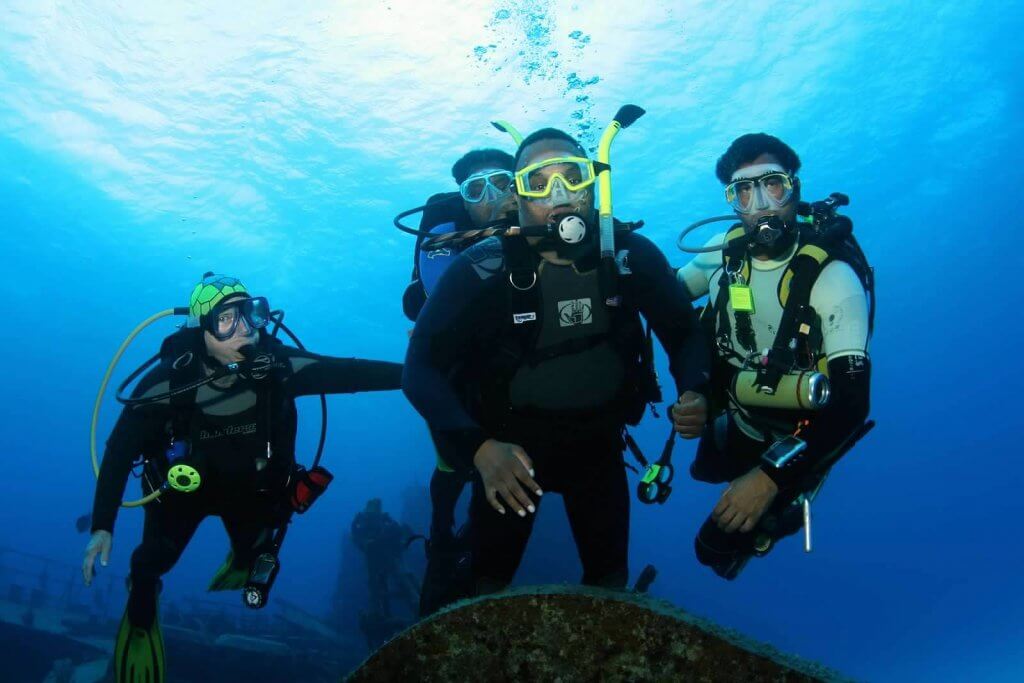From scuba diving to hikes, a plethora of outdoor-based activities are available in programs designed specifically for veterans.
Dive Pirates Foundation
The Dive Pirates started more than 20 years ago as a social group for people who loved scuba diving. When some members learned how to take people with disabilities diving, they wanted to help wounded military veterans explore the world under the water.
The first Dive Pirates trip took a group of wounded Iraq veterans on an underwater adventure. The group has since equipped and guided 71 disabled veterans on scuba excursions. Participants say the water is often a relief from the pain they experience on land.
“The water is such a great equalizer,” said Theresa Cortez, director of communication for the Dive Pirates Foundation. “It just levels the playing field and gives so much mobility back to someone who may have physical disabilities. In the water, freedom, mobility and the ability to stretch out and feel that weightlessness.”
Participants often bring a dive buddy who can help them continue going on scuba adventures into the future.
“What we really love about adaptive diving is that it’s something that people can share with able-bodied people,” Cortez said. “Everyone does this together, and it becomes a bonding recreational sport that someone can do with their spouse or family, or take their family on vacation, something they can all do together.”
Sierra Club Military Outdoors
The Sierra Club, an environmental nonprofit, developed Sierra Club Military Outdoors (SCMO) to help military members, veterans and their families experience the therapeutic qualities of the outdoors while removing barriers that prevent them from accessing nature.
Veterans from all backgrounds have participated in the program, which is poised as an alternative to a traditional clinic mental health setting.
“I think the most powerful situations are when somebody tells you they were suicidal, and now they’re not because of that experience, which has happened multiple times,” said Aaron Leonard, Army veteran and campaign manager for SCMO.
Leonard has led more than 200 nature trips for veterans since 2012.
The excursions, which have included backpacking, paddling and hiking, are led by veterans with outdoor leadership training and include group processing and semi-structured discussions geared toward enhancing the meaning of the experience.
SCMO also advocates for legislative changes to help veterans of all racial and socioeconomic backgrounds have better access to the outdoors while intentionally expanding their programs to reach a broader community.
“There’s a lot of inequality in how people in our country access parks and public lands,” Leonard said. “We’re trying to make it easier for veterans and service members to learn where to go, what to do, how to get there even if they’re older and less able-bodied or in a wheelchair or maybe a walker.”
Outdoor Adventures – Hope For The Warriors
In 2010, Hope for the Warriors, a national nonprofit assisting wounded combat veterans and their families, wanted to offer post-9/11 veterans an escape from the real world. They launched the Outdoor Adventures program, which provides adaptive opportunities for wounded heroes to participate in sporting activities like hunting and fishing.
“I think the therapeutic benefit of being outdoors kind of gravitates better to the veteran than a lot of formal counseling,” said Ken Sutherby, a Marine Corps veteran and director of Outdoor Adventures for Hope For the Warriors. “It’s just so different from their regular everyday life. Usually, there’s no cell phone connection, and it’s a break from everything electronic. They get out there, relax, unwind and just unplug from everything.”
Sutherby said many of the participants are recovering from traumatic brain injuries, and it’s inspiring to see the visible changes in them when they’re spending time in nature with other veterans.
“Day one, they’re usually kind of closed off and not really talkative,” said Sutherby. “After a while of walking in the woods or fishing or whatever we’re doing, they really just open up.”

